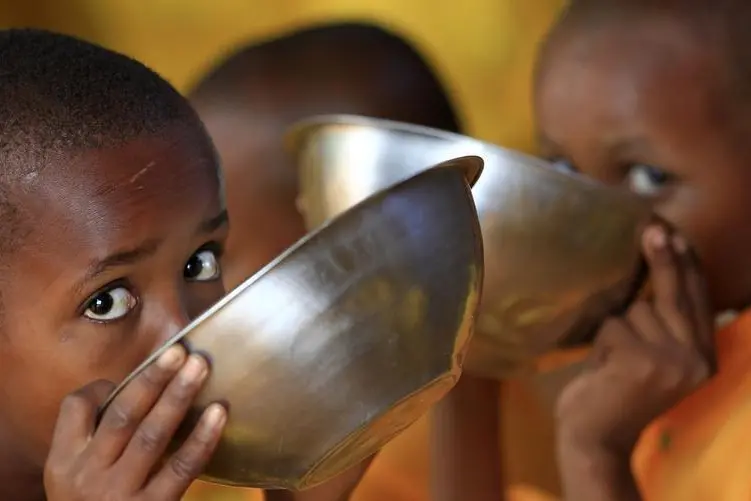PHOTO
By Magdalena Mis
LONDON, March 29 (Thomson Reuters Foundation) - Nearly 27 million people in countries facing famine - Nigeria, Somalia, South Sudan and Yemen - do not have access to safe water, which can be as deadly to severely malnourished children as a lack of food, the U.N. children's agency said on Wednesday.
More than 20 million people - a number greater than the population of Romania or Florida - risk dying from starvation within six months in the four countries due to conflict and climate change, the United Nations said last month.
urn:newsml:reuters.com:*:nL8N1G06JS
UNICEF said water shortages, inadequate sanitation and poor hygiene posed additional risks to malnourished children in the four countries and could lead to fatal diarrhoeal diseases.
" ... unsafe water can cause malnutrition or make it worse, no matter how much food a malnourished child eats, he or she will not get better if the water they are drinking is not safe," Manuel Fontaine, UNICEF director of emergency programmes, said.
"The combination of malnutrition, dirty water and poor sanitation sets off a vicious cycle from which many children never recover," Fontaine said in a statement.
In northeast Nigeria, where millions of people have fled an insurgency by Boko Haram militants, 75 percent of water and sanitation infrastructure has been damaged on destroyed, leaving 3.8 million people without access to safe water, UNICEF said.
In Somalia, which has been hit by the worst drought in 20 years, many water sources have dried up or were contaminated, leaving about a third of the population without access to water, sanitation and hygiene, it said.
UNICEF said conflict had left 5 million people in South Sudan and at least 14.5 million people in Yemen with no access to safe water, basic sanitation and hygiene.
"We are working around the clock to save as many lives as we can as fast as we can," Fontaine said.
"But without an end to the conflicts plaguing these countries, without sustainable and unimpeded access to the children in need of support and without more resources, even our best efforts will not be enough."
Last month, United Nations Secretary General Antonio Guterres said more than $4 billion was needed by the end of March to respond to the emergency, which has resulted in nearly 500,000 children suffering from severe acute malnutrition.
urn:newsml:reuters.com:*:nL1N1G71ND
(Reporting by Magdalena Mis @magdalenamis1; Editing by Katie Nguyen.; Please credit the Thomson Reuters Foundation, the charitable arm of Thomson Reuters, that covers humanitarian news, women's rights, trafficking, property rights, climate change and resilience. Visit
http://news.trust.org
) ((magdalena.mis@thomsonreuters.com; +44 207 5420345 ;))
LONDON, March 29 (Thomson Reuters Foundation) - Nearly 27 million people in countries facing famine - Nigeria, Somalia, South Sudan and Yemen - do not have access to safe water, which can be as deadly to severely malnourished children as a lack of food, the U.N. children's agency said on Wednesday.
More than 20 million people - a number greater than the population of Romania or Florida - risk dying from starvation within six months in the four countries due to conflict and climate change, the United Nations said last month.
UNICEF said water shortages, inadequate sanitation and poor hygiene posed additional risks to malnourished children in the four countries and could lead to fatal diarrhoeal diseases.
" ... unsafe water can cause malnutrition or make it worse, no matter how much food a malnourished child eats, he or she will not get better if the water they are drinking is not safe," Manuel Fontaine, UNICEF director of emergency programmes, said.
"The combination of malnutrition, dirty water and poor sanitation sets off a vicious cycle from which many children never recover," Fontaine said in a statement.
In northeast Nigeria, where millions of people have fled an insurgency by Boko Haram militants, 75 percent of water and sanitation infrastructure has been damaged on destroyed, leaving 3.8 million people without access to safe water, UNICEF said.
In Somalia, which has been hit by the worst drought in 20 years, many water sources have dried up or were contaminated, leaving about a third of the population without access to water, sanitation and hygiene, it said.
UNICEF said conflict had left 5 million people in South Sudan and at least 14.5 million people in Yemen with no access to safe water, basic sanitation and hygiene.
"We are working around the clock to save as many lives as we can as fast as we can," Fontaine said.
"But without an end to the conflicts plaguing these countries, without sustainable and unimpeded access to the children in need of support and without more resources, even our best efforts will not be enough."
Last month, United Nations Secretary General Antonio Guterres said more than $4 billion was needed by the end of March to respond to the emergency, which has resulted in nearly 500,000 children suffering from severe acute malnutrition.
(Reporting by Magdalena Mis @magdalenamis1; Editing by Katie Nguyen.; Please credit the Thomson Reuters Foundation, the charitable arm of Thomson Reuters, that covers humanitarian news, women's rights, trafficking, property rights, climate change and resilience. Visit





















